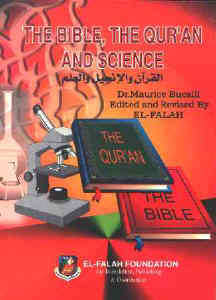Bible,Quran and Science

|
|
ConclusionsThe facts recorded here and the commentaries quoted from several extremely eminent Christian experts in exegesis have refuted affirmations of orthodoxy supported by the line adopted by the last Council on the absolute historical authenticity of the Gospels. These are said to have faithfully transmitted what Jesus actually did and taught. Several different kinds of argument have been given. Firstly, quotations from the Gospels themselves show flat contradictions. It is impossible to believe two facts that contradict each other. Neither can one accept certain improbabilities and affirmations that go against the cast-iron data provided by modern knowledge. In this respect, the two genealogies of Jesus given in the Gospels and the untruths implied in them are quite conclusive. These contradictions, improbabilities and incompatibilities pass unnoticed by many Christians. They are astonished when they discover them because they have been influenced by their reading of commentaries that provide subtle explanations calculated to reassure them and orchestrated by an apologetic lyricism. Some very typical examples have been given of the skill employed by certain experts in exegesis in camouflaging what they modestly call 'difficulties'. There are very few passages indeed in the Gospels that have been acknowledged as inauthentic although the Church declares them canonic. According to Father Kannengiesser, works of modern textual criticism have revealed data which constitute a 'revolution in methods of Biblical exegesis' so that the facts relating to Jesus recorded in the Gospels are no longer 'to be taken literally', they are 'writings suited to an occasion' or 'combat writings'. Modern knowledge has brought to light the history of Judeo-Christianity and the rivalry between communities which accounts for the existence of facts that today's readers find disconcerting. The concept of eyewitness evangelists is no longer defensible, although numerous Christians still retain it today. The work done at the Biblical School of Jerusalem (Fathers Benoit and Boismard) shows very clearly that the Gospels were written, revised and corrected several times. They also warn the reader that he is "obliged in more than one case to give up the notion of hearing Jesus's voice directly". The historical nature of the Gospels is beyond question. Through descriptions referring to Jesus however, these documents provide us above all with information about the character of their authors, the spokesmen for the tradition of the early Christian communities to which they belonged, and in particular about the struggle between the Judeo-Christians and Paul: Cardinal Daniélou's work is authoritative on these points. Why be surprised by the fact that some evangelists distort certain events in Jesus's life with the object of defending a personal point of view? Why be surprised by the omission of certain events? Why be surprised by the fictitious nature of other events described? This leads us to compare the Gospels with the narrative poems found in Medieval literature. A vivid comparison could be made with the Song of Roland (Chanson de Roland), the most well-known of all poems of this kind, which relates a real event in a fictitious light. It will be remembered that it describes an actual episode: Roland was leading Charlemagne's rear-guard when it was ambushed on the pass at Roncevaux. The episode which was of minor importance, is said to have taken place on the 15th August, 778 according to historical records (Eginhard). It was raised to the stature of a great feat of arms, a battle in a war of religion. It is a whimsical description, but the imaginary element does not obliterate one of the real battles that Charlemagne had to fight in order to protect his frontiers against the attempts made by neighbouring peoples to penetrate his borders. That is the element of truth and the epic style of narrative does not remove it. The same holds true for the Gospels: Matthew's
phantasms, the fiat contradictions between Gospels, the
improbabilities, the incompatibilities with modern
scientific data, the successive distortions of the
text-all these things add up to the fact that the Gospels
contain chapters and passages that are the sole product
of the human imagination. These flaws do not however cast
doubt on the existence of Jesus's mission: the doubt is
solely confined to the course it took.
|
